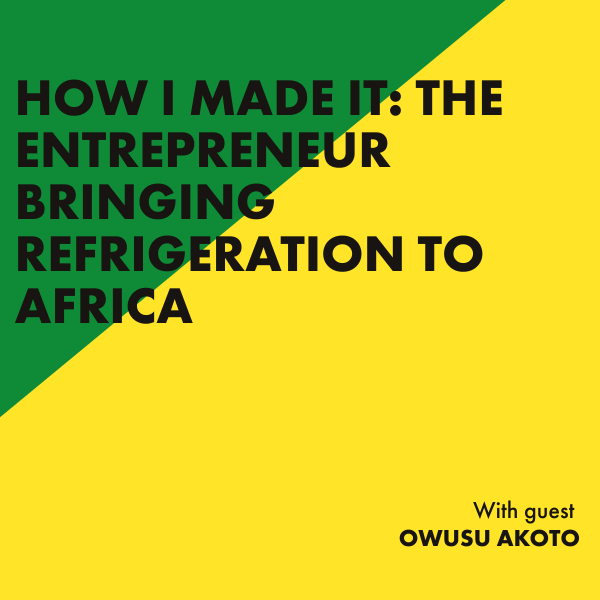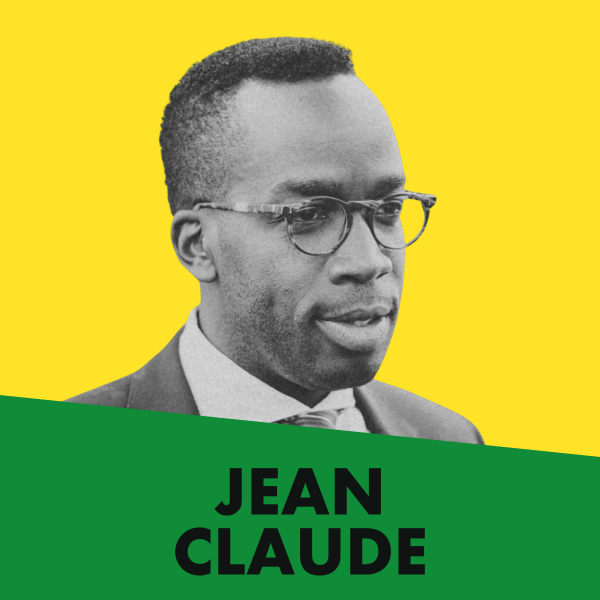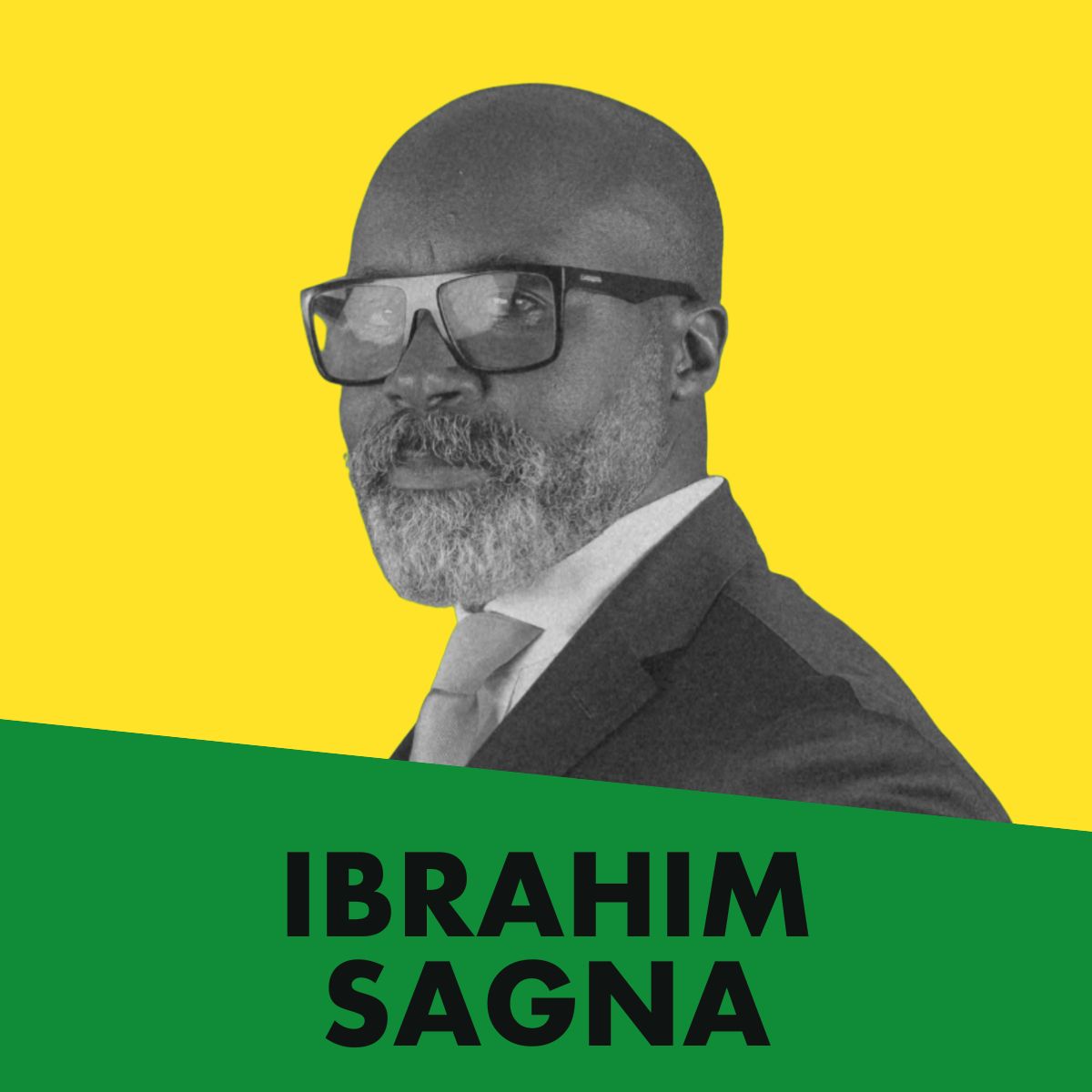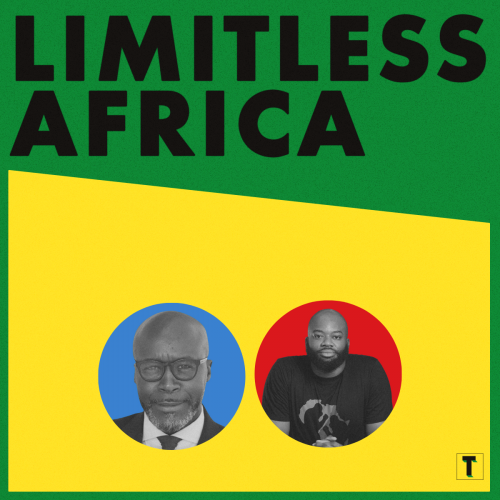OWUSU AKOTO:
So this is how we solve the problem of the Farmer Erics of the world. And this is just one farmer. There are 2.1 billion Farmer Erics in the global south ah you know, in places, in regions, not out not just in Africa, in Southeast Asia, South Asia, Latin America and the Caribbean. This is one of the big global problems which has such deep consequences.
CLAUDE:
Owusu Akoto, welcome to Limitless Africa.
Owusu is the founder of FreezeLink, which provides temperature-controlled transport and warehousing services in Ghana and distributes perishable food and medicine across Africa.
Owusu is the son and grandson of farmers, so he knows the types of logistical problems farmers face personally. He also embodies African academic excellence.
He’s a graduate of the University of Pennsylvania and was recently recognized by the Massachusetts Institute of Technology, MIT, as a Foundry Fellow. Owusu is one of Africa’s leading entrepreneurial ecosystem builders.
So, Owusu, we’ve known each other for a long time. I’ve introduced you, but could you actually do it yourself?
OWUSU:
Sure, sure. So I’m the son of a mango farmer. I’m the grandson of a cocoa farmer. And this really frames the entrepreneurial journey.
But my personal inflection point really started when I left Ghana as a teenager to study in the US. As you mentioned, I did my undergraduate scholarship at the University of Pennsylvania.
But I spent most of my career thereafter working in supply chain based out of London. So in London, I worked as a consultant advising major FMCG companies on their food supply chain, companies like Unilever, Nestle, Red Bull.
And I was so incredibly wowed by modern food supply chains. But at the same time, it was jarring for me because I kept on going back in my mind to all the waste that I’d seen from childhood on the farm.
So much waste that you would see and walk on carpets of rotten mango or whatever the crop would be on the farm. And I realized that, well, look, there had to be another way.
So this got me thinking about you know how do we create the networks of temperature control logistics that really are required minimize the cost of food and minimize the food waste that I’d seen and that from childhood.
And this really gave birth to Freezelink.
CLAUDE
Well, you said minimizing food waste, which sounds like a very worthy endeavour, but what actual problem are you trying to solve? Is that it or is there a a bigger kind of underlying problem?
OWUSU:
Yeah, it’s a great question. I can answer by telling a short story of one of our favourite customers… is a farmer called Eric.
And he, for those of you have been to Ghana or know Ghana, he has his farms about two and a half hours from the airport north. And he grows berries, miracle berries.
Now, miracle berries are a red berry. They are used as a natural sweetener. He exports some of his miracle berries. He processes them into tablets and exports them mainly to the U.S. But most of the miracle berries that he grows, they are sold frozen. Now, farmer Eric had two huge issues. One is that his post-harvest losses were 60%. So 60% of everything that he grew and purchased from smaller farmers perished because he did not have the right cold chain logistics.
And secondly, of the 40% that remained, he was selling them at a discount because they were at a lower quality.
There’s two issues there that we’re solving for as Freezlink through our interventions. Cost and quality. So we’re trying to build a hub and spokes network for Africa for temperature control logistics to to enable us to minimize the cost and the wastage of food that is highly perishable in particular, but also healthcare care products.
CLAUDE:
So now that you explain what you do and why you do it, it’d be good to understand how you do it, as in how you’re solving problems like the problem that Eric has that you’ve just described with the berries.
OWUSU:
Yeah, great. So at FreezeLink, we do three things. If something is cold, we store it, we transport it, and we build. So somebody like Farmer Eric can come to Freezelink We’ll build the near-farm or on-farm cold storage that and they need. We then are able to transport what they produce from their farm ah to where the consumers are, and and and then we are able to store it for them in the course of distributing to retailers.
So this is how we ah solve the problem of the Farmer Erics of the world. And this is just one farmer. There are 2.1 billion Farmer Erics in the global south. In places, in regions, not out not just in Africa, in Southeast Asia, South Asia, Latin America and the Caribbean.
This is one of the big global problems which has such deep consequences.
CLAUDE:
Well, I mean, we often on this podcast talk about shared prosperity, but but obviously a lot of what we discuss really is geared towards our listeners and it’s really about advice and and actionable insights into the marketplace.
And given that you’ve done it what advice would you give African entrepreneurs, not just Ghanaian entrepreneurs, but African entrepreneurs broadly defined, who are looking to build what we’ll call game-changing solutions to Africa’s biggest problems?
OWUSU
Yeah, I think two things, mirrors and villages. I attended a talk in in in New York, I think it was about 10 years ago.
And somebody I hugely respected and admired was speaking to us as a small group. And he was talking about the fact that you know one one of his key to his success was having a personal board. So these were you know a group of, let’s say, five people who he looked up to, um who had so much to teach him about life and about business.
And for all the major decisions in his life, he would refer to these same group of five or so people. And that piece of advice really, really stuck with me.
And I adopted the piece of advice. And that speaker was you, Claude. You may not remember, but it was one of the sessions…
CLAUDE:
Oh, wow. ah That brings it all full circle. Okay.
OWUSU
It does indeed. But it’s honestly a piece of advice that um really resonated with me and and is an advice that I’ve passed on to other people as people have come to me for advice on on on on navigating the the up and down, the roller coaster that is entrepreneurship.
And then the second thing is that and I’m saying this as a solo founder, you know I was never one of those people who grew up and wanted to found a business by myself. My world view is that ah to really solve big, huge problems, ah you need an incredible team. The thing is that when you’re running a business, whether it’s especially the sole founder, and even if you’re not, it’s so important to have people within your team, close to your business, who are able to, you know, give you that that that honest feedback.
And, you know, in Africa, traditionally, we have hierarchies based on on age and other many other things. And so working at building a culture within your organization where you’re really able to benefit from the minds of everybody within your team, including your own mind by having people with complementary mindsets and skill sets really is key. It is so key.
You know, I think that the successful entrepreneurs on the continent are great entrepreneurs globally because of the poverty of other resources and for foundational infrastructure. And so to overcome all of these obstacles are really for me, it requires a village and requires that mirror so that you get that critical feedback on a daily basis.
CLAUDE:
So Owusu, bringing us back to that conversation we had maybe two decades ago, which actually took place in New York City, I realized that I’ve learned a lot from the U.S. and what we’ll call the American mindset and bring a lot of my own African mindset to a lot of situations that I’m facing as an entrepreneur and as an investor.
How would you describe what you were able to learn from the American mindset?
OWUSU
Sure, I think, i think it comes down to two things, right? One is the can do attitude. You know, I’ve been fortunate in that I’ve lived, I’ve called home three separate continents, Europe, the US, North America and Africa.
The can do attitude, ah which really, for me, encapsulates the American mindset is quite unique. The idea that, you know, every, every, every, every Clark Kent can become Superman, every Diana Price can become Wonder Woman, just so ingrained in, is one of those take it for granted assumptions that Americans carry around with them and and certainly has rubbed off on me. And perhaps the second one is around how, for me, America is the the biggest advert in history for how success compounds.
And, you know, as an entrepreneur, this really manifests in entrepreneurial ecosystems. And so, you know, when you look at places like Boston, Austin, obviously Silicon Valley, there’s not only a dance between entrepreneurs and providers of capital.
The government government historically has played a huge part in being a catalyst for creating prosperity through entrepreneurship. C
LAUDE:
Yeah, you talk about success, but one thing I’ve noticed here working as an entrepreneur in America is also you don’t get stigmatized for failure, right?
A lot of investors value founders who have failed in the past and who learned from those failures. And that previous failure and it might lead to future successes, how they evaluate investment opportunities and the character and the grit that it takes for a founder to deal with all the challenges that come with launching and scaling a company.
So that’s something that I would say is is very good about the American mindset when it comes to entrepreneurship.
But then let’s take it back to Africa. What is it about your African upbringing that you think might have led to your journey and your desire to start and grow a company like Freezelink?
So that there there is a communal mindset ah that you don’t fully appreciate as an African until you spend time as an adult in particular ah in in in um a more individualistic society as you get in the US or in Western Europe.
And you know I was living in London um i was very comfortable ah materially in London um part of the thing that pulled me to come back was uh you know not only you know wanting to be closer to my parents in particular but also to to really leave a legacy that was closer to home for for the community and not just the community in you know Ashanti region of of Ghana but across the continent
CLAUDE:
I remember I spoke with you when you were living in London and yeah, it’s you know you had a good life and money in the bank and bills were were paid and you could have just settled for that as many Africans have done, right? the Life and and in in the Western world and the comforts that come with that life in the Western world, but you actually decided to do something meaningful in your own country and I have an awful lot of respect for that.
So what’s the one thing we should be talking about, but we’re not talking about, when it comes to Africa’s limitless potential?
OWUSU:
That’s a great question. It’s a deep question.
The one thing we should be talking about in terms of Africa’s limitless potential is food. Africa contains the most amount of oF uncultivated arable land in the world. So 60% of the uncultivated arable land on the planet is in Africa.
And this matters. Why? Because you know the climate is changing, whether we like it or not. Our ability to grow what we grew yesterday, tomorrow is more difficult.
And everybody has to eat. And so the innovations that happen in Africa that enable the farmer Eriks of this world to grow more food, but also especially to get that food to consumers, is key not only for Africa to feed itself, as we double our population as a continent between now and 2050, but also for Africa to feed the world.
CLAUDE:
Thank you for listening to Limitless Africa, the podcast that looks at how Africa and America can work together for shared prosperity. It’s sponsored by the US Department of State and the Seenfire Foundation.









